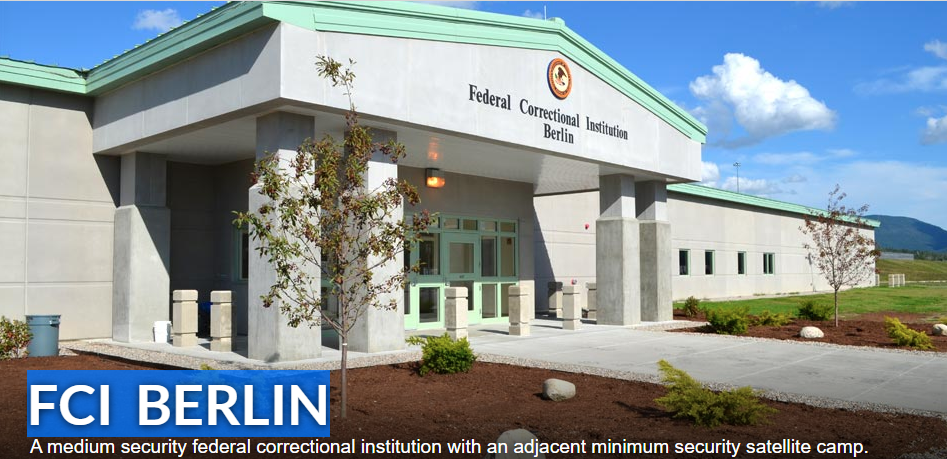By NANCY WEST, InDepthNH.org
CONCORD – The federal Bureau of Prisons told the Berlin Sun on Wednesday that a staffer tested positive for COVID-19 at the Berlin medium-security facility in New Hampshire. No inmates have tested positive.
Berlin Mayor Paul Grenier said he had heard a rumor, but was waiting for confirmation Wednesday afternoon and he wasn’t pleased that news outlets knew before Berlin’s emergency management team.
Shortly after 10 p.m. Wednesday, Grenier told InDepthNH.org that he heard from a senior source at the federal prison that there was no positive confirmation in Berlin, that the staffer had been transferred and hadn’t been in the Berlin facility for 11 days. He said CNN, which also reported the story, and AP may have distributed a story that wasn’t accurate. Attempts to reach state officials Wednesday night were unsuccessful.
The confirmation came the same day ACLU-NH and the New Hampshire Association of Criminal Defense Lawyers asked state officials to release the most vulnerable inmates from jails and prisons when possible due to COVID-19, and short of that make changes so inmates will be more comfortable given that they cannot receive visits from family or their lawyers because of the epidemic.
And the same day state officials announced 13 new cases in New Hampshire bringing the total to 39, with an increase in the cases believed to be spread from community-based contact.
People involved in the criminal justice system are at a higher risk of COVID-19 given close quarters and because they are often already in poor health, and more so in New Hampshire where the prison system has a disproportionate elderly population, ACLU-NH said.
“This is an unprecedented health crisis and requires urgent and creative steps to protect those most vulnerable to infection,” said Devon Chaffee, executive director of the ACLU-NH.
“Every aspect of the criminal legal system, from policing, prosecution and pretrial hearings, to sentencing, confinement, and release, must come under intense scrutiny for how it responds to this national public health crisis. We make these asks not on a permanent basis, but exclusively in response to this crisis we are all in together.”
It’s not an idea that is likely to gain traction with Republican Gov. Chris Sununu, according to his spokesman Ben Vihstadt. Attorney General Gordon MacDonald didn’t respond to questions about the ACLU-NH request.
“Not only does the ACLU want to handcuff law enforcement’s ability to do their job, but they also want to release potentially dangerous prisoners in the middle of a state of emergency,” Vihstadt said in an email response.
Vihstadt said the state Department of Corrections has already
taken steps to limit exposure in the prisons.
“And the Superior Courts have already suspended jury trials in an effort to
limit community spread of COVID-19,” Vihstadt said.
Jim Dale, an inmate at the Northern New Hampshire Correctional Facility, the state prison that is also in Berlin, said there are some inmates who want to be tested for COVID-19, but have been unable to get the test.
Inmates in the infirmary are very ill and elderly and would likely die if there is an outbreak at the prison, Dale said.
Dale, who is serving a minimum of 60 years for raping and smothering a child in 1997, is still fighting his conviction claiming he is innocent. He said there is little going on at the prison to protect inmates from the virus.
“It’s otherwise business as usual,” said Dale. “Nobody is telling us anything.”
If an inmate owns a tablet, there are instructions to wash hands, but they cost $150, Dale said, and all cells are for two inmates.
Dale said officials are recommending inmates get a flu shot if they didn’t get one and the usual $3 fee will be waived, but there is no vaccine for COVID-19.
Robin Melone, president of the New Hampshire Association of Criminal Defense Lawyers, said: “People who are older than 65, who are immunocompromised, or who have underlying conditions must be moved out of New Hampshire’s incarceration system before COVID-19 affects these facilities.”
Melone said police and prosecutors must take steps to reduce the number of people entering the criminal legal system during the crisis. “Such measures are being recommended exclusively on an interim basis in recognition that correctional facilities put people at heightened risk of exposure. We believe these steps can and should be taken while protecting public safety,” Melone said.
ACLU-NH is also urging county houses of correction and the Department of Corrections to release COVID-19 response plans to the public that ensure residents’ civil rights are upheld while changes are made to protect against the virus. The ACLU-NH is also asking facilities to work with contracted vendors to reduce or waive fees for phone calls, video calls, and emails—only options left for residents to contact their loved ones after a facility ends visitation hours.
“Residents of New Hampshire’s correctional facilities, along with their friends and family, deserve to know the steps being taken to protect their health and safety during this public emergency,” Chaffee said.
“Transparent plans from correctional facilities will ensure everyone is informed when it comes to visitation, testing, treatment, and the overall processes for handling COVID-19. With some facilities already announcing the end of visitation, it is crucial that their residents have a free or low-cost way to contact their family, friends, and legal counsel.”





